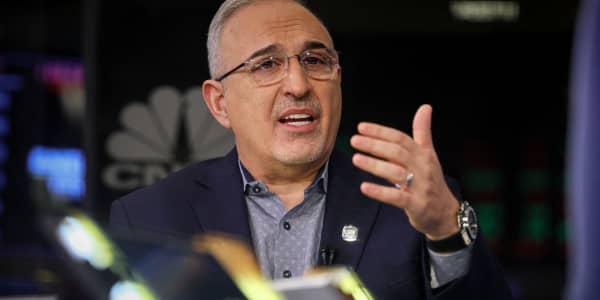Workers are unhappy as layoff fears continue to loom, work-from-home flexibility is on the fritz, and there are continued battles for pay transparency.
But it seems Black workers are among the most unhappy, with 49% of those surveyed saying that they want to quit their jobs, according to a recent Indeed report. The reasons why Black workers are considering leaving their jobs include pay transparency issues, misalignment of personal values with company values, and wanting a more diverse leadership team.
This is nothing new, said Aaronde Seckou Creighton, chief diversity officer at the Leadership Circle, a business leadership development firm. Creighton said marginalized communities have been unhappy in the workplace for years prior to the Covid-19 pandemic. The pandemic simply signaled the masses to voice unhappiness at work, allowing communities of color to speak out too.
"Since 2020, with all the social unrest in this country that's been ongoing, companies are now really saying, 'This is what we're going to do around issues of inclusion, equity, and access,'" Creighton said. "What's happening now is more people are willing to leave their jobs loudly."
With workers still retaining some bargaining power in the workforce, Creighton said companies and HR professionals need to do more to retain Black workers, and diverse workforces as a whole, which can start with recruiting diverse leadership for senior positions.
Recruit diverse leadership throughout entire company
An recent Indeed and Glassdoor report found that over 60% of workers would turn down an offer or leave a company if they felt their manager or potential manager didn't support DEIB, or diversity, equity, inclusion, and belonging initiatives.
"If organizations have a true commitment to inclusion and equity, then they'll begin to make sure that they're hiring top notch Black, Asian, Latinx, female, and neurodiverse leaders in their executive ranks," Creighton said. "Once that happens now, then there's a voice there."
Creighton said without more diversity in leadership, a lot of issues will continue to plague the workforce, especially impacting people of color.
"In some situations, where companies are focused on inclusion and equity, we're still not seeing diversity at the senior and executive levels," Creighton said. "So, a lot of the reasons that are highlighted in the Indeed report, whether it's pay transparency or alignment of values, these issues can be prioritized more if there's diversity at the senior and executive level."
Earn the trust of your workers
While companies have implemented programs and resources for workers of color, like employee resource groups and speaking out about inequities, one component that might go underrecognized is whether employees trust their companies and feel supported by them, said Alex Noether, an associate partner at Bain & Company, who focuses on DEI and racial equity.
"Issues with pay equity and company values, to me, speak a lot to the trust component of an organization," Noether said.
"When you think about systemic inequities existing in society and affecting marginalized communities, particularly Black populations, you can't just go in with a notion that people should presume to trust their company. Companies have to earn trust," he added.
Noether said companies who commit to pay equity, fix the pay gaps, gather the information, and publish salaries garner a lot of trust from their workers. Also, when there's diverse leadership, and workers feel like their voice is represented, they're more likely to trust their organization.
Fix promotion and advancement inequities
Historically, there's inequity in how people seek new roles, get promoted, and advance in their careers within a company. Many people of color, especially Black workers, face discrimination and prejudice while other workers sometimes advance their roles through nepotism and knowing the right people in the right places.
"Companies need to stop using the excuse that they can't find qualified people. It's frustrating for many Black professionals with this issue of a moving target," Creighton said.
The moving target is a phrase used to show how the qualifications for a position adjusts based on who's applying for the role, which has affected Black workers and people of color the most, he added.
"This is where we see a vice president promoted into a position, who may only possess a bachelor's degree with 10 years of experience, while a leader of another ethnic background might need to have a master's degree and 20 years' experience to be promoted to the same position," Creighton said.
Noether said research he's worked on shows getting feedback and fair growth opportunities in the organization is a strong factor in whether employees trust their company. When workers trust and feel supported by their companies and feel as though there's a transparent career path for them, they're more likely to continue working there.
Allow your employees to be authentic
There's a phenomenon for Black workers, and workers from all ethnic backgrounds, Creighton explained, where they often feel like they have to either speak or dress differently than their authentic identities, and it's yet another reason why they're leaving their jobs.
"People aren't bringing their whole selves to work, or they're thinking 'What do I have to do differently, or maybe even better, to receive promotional opportunities?'" Creighton said.
Companies have to create an environment that not only promotes diversity in the workplace, but welcomes and encourages it, Creighton said. Companies can start with recruiting diverse leadership, because workers seeing people who look like them in leadership roles is a good place to start alleviating these issues.
"The weight of having to show up differently than who I authentically aim is a big driver of what's causing people to find another organization, even if it means possibly taking less money, losing tenure, or losing stock options," Creighton said. "For most people of color, coming home every day to the people they love with an extra 50 pounds of weight and exhaustion is not worth it to them anymore."
To join the CNBC Workforce Executive Council, apply at cnbccouncils.com/wec.






